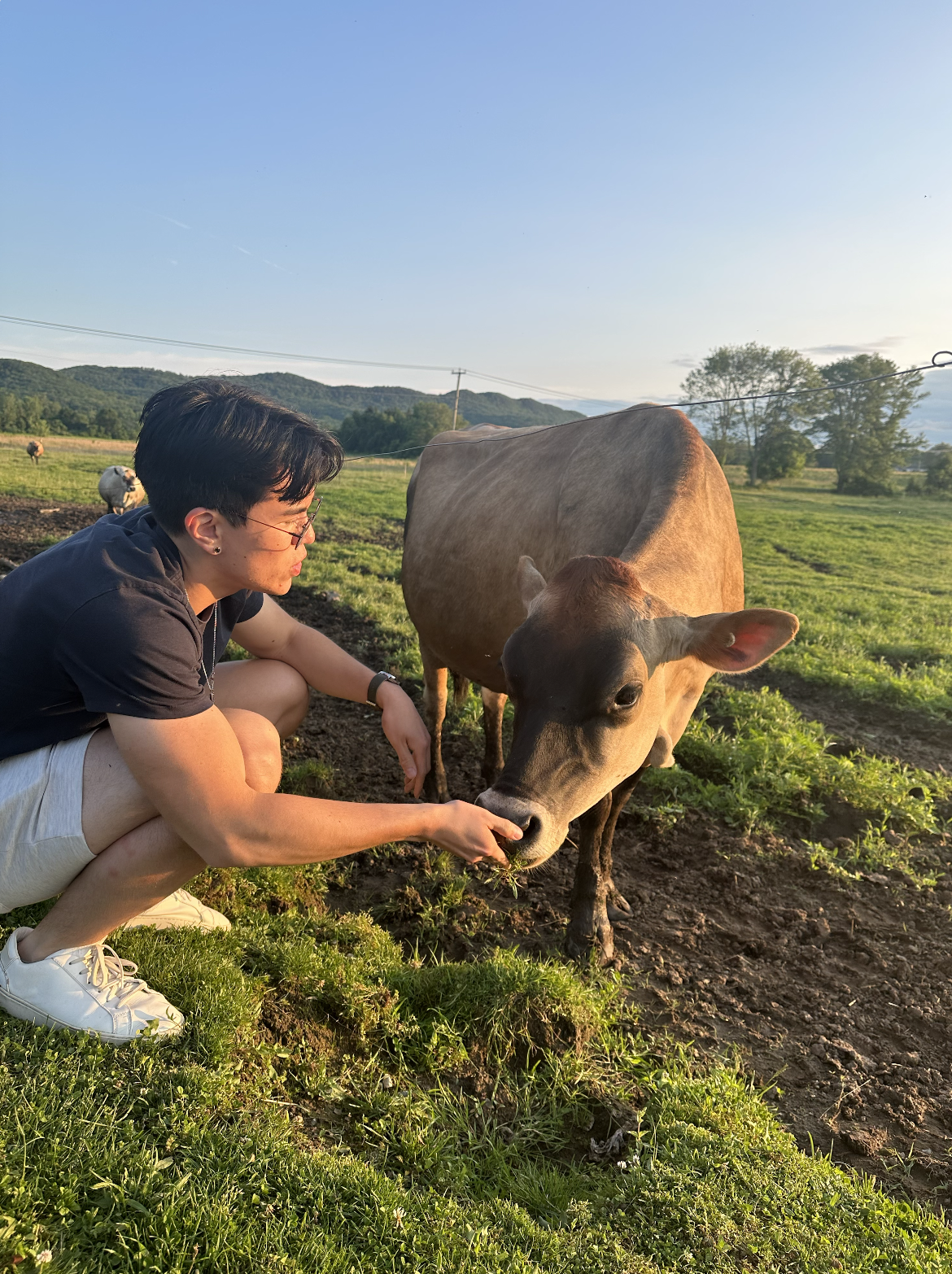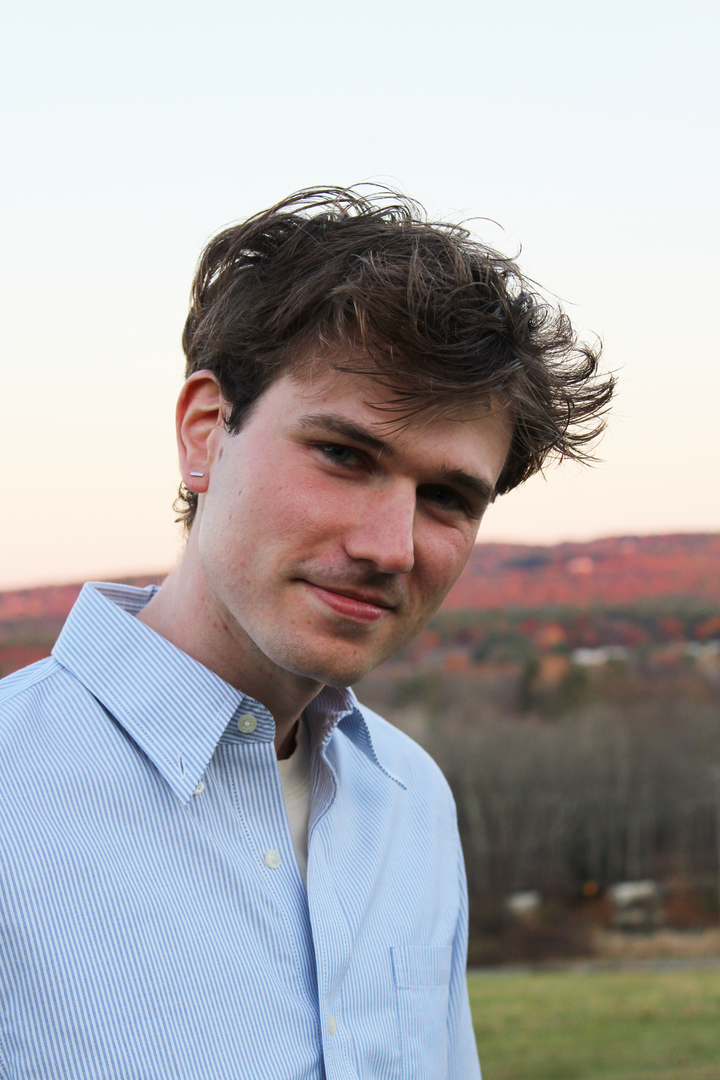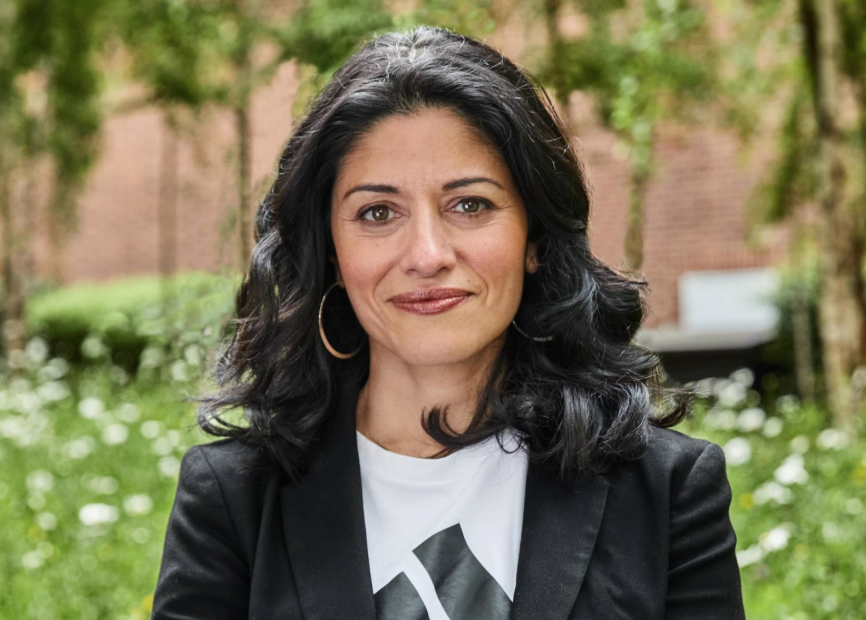Tim Carroll: “A Dedication of Principle”
Whether studying philosophy, performing on stage, or advocating for the rights of animals, Tim Carroll is intentional in the way he crafts his life.

I sat down to write this article in the most “Tim Carroll” way I could muster — typing at a cubicle down in B-level, abiding by a small chunk in my Google Calendar labeled “Deep Focus.” My phone is turned off and buried at the bottom of my bag, and a small notebook sits to my right. I am missing the uniform, however: a suit and tie, a pair of dress shoes.
The Tim Carroll Study Routine is as precise and intentional as the way he lives his life. Often known for his vegan lifestyle, weightlifting, or dedication to formalwear, he describes each of these seemingly disparate practices as rooted in a “serious commitment to some sort of value.” With clear ideas on what he cares about: the rights of animals, taking care of your self and body, and “respecting the [academic] institution you’re in,” there is no exaggeration to the thought and discipline he puts into managing his time. Tim himself recognizes that most people look at him and think, “Wow. Tim has his sh*t together.”
However, Tim didn’t always have this strong self-discipline; in fact, he used to be quite the opposite.
Finding Structure and Growth
Growing up in Montgomery, New Jersey, Tim was a “really shy, really introverted, and pretty socially awkward” kid with long hair down to his shoulders. Given a lot of independence at a young age and unrestricted internet access, he used to stay up late, procrastinating and putting off his homework.“I accrued a record number of absences from middle school,” he shared.
But everything changed for Tim when he enrolled in the Solebury School in Pennsylvania. The strict routine of the boarding school environment gave him the structure he needed, and within four years, Tim went from his previous daze of sleeplessness and procrastination to valedictorian.
He became heavily involved in Solebury’s debate team, where he went on to become team captain, teaching and guiding the younger students. While he loved the environment, the effect it had on him was complicated. “I took out my teenage aggression [and] I channeled it into debate,” Tim said, “which was great in some ways, but it spilled over into my general life … I had this almost kind of aggressive, argumentative, academic energy.” That was until his guidance counselor, Julie Lang, urged him “to realize how other people are going through the world — not everything is an argument.” But while he worked to change his approach, he never regretted the strength of his judgement. It was debate that sparked his budding interest in law and philosophy.
Cultivating Purpose at Amherst
Tim chose Amherst because he wanted a humanities-focused college with a “very small, tight-knit environment” similar to Solebury. Plus, he already knew he wanted to major in Law, Jurisprudence, and Social Thought (LJST).
His freshman year, Tim dedicated himself to his studies and was a member of Amherst’s men’s frisbee team “Army of Darkness.” But he soon realized that he wanted more from his college experience. “Halfway through my first semester, [I was] like, what am I doing here? Am I just gonna play frisbee all day? Like, I need to do something meaningful,” Tim said.
Tim joined ACEMS, becoming a teaching assistant in January of 2023. And, during his sophomore year, he started Veggie Club — one of the more notable pieces of his legacy. Beginning as a joke between him and Hannah Koo ’25, Veggie Club was Tim’s way of advancing his goal of converting people to vegetarianism, promoting its annual “Veggie Febbie,” in which members are encouraged to go vegan, vegetarian, or reduce their consumption of animal products for a month. And, in return, they receive daily emails, some of which quote the seminal text “Animal Liberation” that converted Tim to a plant-based diet back in high school.
It was at Veggie Club where I first met Tim in the fall of his junior (and my freshman) year — sitting at a table in the Ford Hall Event space where members of Veggie Club were feasting on the traditional end-of-February catered dinner from Pulse Cafe, a vegan restaurant in Hadley. It was a communal space — mutual complaints were being shared surrounding the lack of plant-based protein options in Val during the weekends, and a large chunk of the club was engrossed in conversation surrounding John E. Kirkpatrick 1951 Professor in Law, Jurisprudence and Social Thought Adam Sitze’s class, “Arendt’s Judgements” (notably, one of Tim’s favorite classes at Amherst). Tim, somehow balancing both conversations, had his ACEMS walkie-talkie out on the table, awaiting a call at any second. While organizing a dinner while on-shift as an EMT may already seem like a stressful situation, Tim was also continuing to write his “Exercises in Thought” column with Joe Sweeney ’25, serving as editor-in-chief of The Contra and vice president of weightlifting club, and starring in Luke Herzog ’24’s play “We Open on a Red Desert.”
To quote Matteo Frignani, one of Tim’s closest childhood friends from middle school: “Tim is just one of those people who’s just naturally good at a bunch of stuff.” But while he perhaps has many talents, Tim soon realized he had too much on his plate.
It was during his semester abroad that he reached this realization. Hearing that it was an academically rigorous and transformational experience, he spent his junior spring at Oxford. While the experience lived up to its reputation, with a heavier course load than most, he found it difficult and isolating at times. “I just got some very hard tutors,” he shared.
For Tim, being abroad also made him more homesick than he expected. “I realized how much of a patriot I was at heart, and how much of an American I am,” he shared.
It was outside the challenging academic semester that he learned the most about himself and his direction. “I was really not expecting abroad to be so great for just the time spent alone during Easter vacation by myself, thinking and reflecting,” he said. All the time he spent “passing hours on trains and planes with no WiFi” gave him the opportunity to think, and he left Oxford with a clear idea of what he found most important: animal rights. “It’s an incredible injustice that animals don’t really have bona fide rights in the same way that humans do,” he shared. “It’s just awful. And so I want to spend my life work doing that, which I think happens best at the intersection between law and philosophy.”

Final Year: Direction and Focus
Returning to Amherst for his senior year, Tim shed most of his extracurriculars, including quitting ACEMS and passing off Veggie Club to new leadership. He continued to perform in Voices of the Class, a skit written from (often out of context) excerpts from admissions essays — this year, Tim co-directed alongside Lydia Silver ’25 and Slate Taylor ’25. He also worked as a teaching assistant for Associate Professor of Spanish and English Sony Coranez Bolton’s class “Playing Video Games” (although much of his research for the position involved logging hours playing Final Fantasy into Workday).
While he was still busy, after his realization abroad, his primary focus was on his thesis. Titled “An Elephant is Not a Person: The Capabilities and Wonder of Animal Jurisprudence,” his thesis is based on The Happy v. Breheny Case: a lawsuit against the New York Bronx Zoo on behalf of an elephant.
Tim described the process of writing his thesis as “a long, hard, grueling, rewarding, satisfying, exhausting process of just thinking, reading, writing, talking with Sitze, reflecting, searching through the literature, finding a lot of dead ends.”
However, Tim made sure the process of writing didn’t completely overtake his life. As a self-proclaimed disciple of Cal Newport, a productivity author who wrote books such as “Deep Work” and “Digital Minimalism,” Tim believes that if there is something you want to do, “you got to carve [the time] out, and you got to schedule it so you can protect it.” While there are colorful, blocked-out chunks of his Google Calendar dedicated to thesis work and academics, there are also similar blocks isolated for poetry, socialization, even morning meditation sessions (a few of which I have attended — and many of which I have slept through).
While Tim shed a lot of his previous commitments, he still found ways to become involved in the things he cares about. “I had this big realization of ‘my time in college is running out’ and there are some things — like a little fun Shakespeare production in college — that you’re not able to do afterwards,” he said.
This spring, Tim and Miles Garcia ’26 put on a rendition of William Shakespeare’s “Twelfth Night.” An entirely student-led production, Tim and Garcia directed the play as well as acted in it. When one of the leading actors dropped out the day before the show, Tim, already set to play four out of the fifteen roles in the play, stepped in; the morning of the opening night, he began to memorize the lines of his now-fifth character. Somehow, Tim performed off-book by showtime at 8 p.m. that night.
Philosophy, Law, and Teaching
Now, with both his thesis and “Twelfth Night” done, Tim looks ahead beyond graduation. While he is still unsure of his exact plans, he intends to take one to two years off before heading to law school — hopefully teaching at an institution similar to Solebury. If not, he plans to join an animal advocacy organization or work as a paralegal before getting his J.D. Then, he hopes to “practice animal law, making novel legal arguments for the rights of animals.”
“It’s pretty much just the kind of stuff I did in my thesis,” he said. “I want to put the ideas in my thesis to the test.”
While animal law is where Tim sees himself enacting widespread change, he hopes to eventually return to teaching and mentorship. In the final years of his life, he would love to be “back at a boring school, being a wise and sage old man — teaching kids, drawing on, hopefully, a rich life with experiences, and mentoring high school students, being a debate coach again — working with arguments and ideas.”
Education reveals itself as a throughline through much of Tim’s time at Amherst — working as a teaching assistant for both ACEMS and “Playing Video Games,” although much of Tim’s work as a teacher occurred when he wasn’t getting paid for it — taking an hour out of his day to show confused, unathletic types (like me) around the weight room or sending carefully crafted Veggie Club emails.
“Oftentimes people just need a supportive human to be with them through the first steps of something, and not try to shove something down their throat, even if it’s vegetables,” Tim said.
Conversation and Company
In contrast to the “aggressive, argumentative” demeanor he was known for back in high school, now, much of Tim’s impact comes from simply engaging and conversing with other people — talking, and sometimes arguing, about the things he cares about.
“There’s really something to be said about Val sitting being a thing,” he said, “because Amherst has really interesting people — just passing a few hours with really interesting people living in the present, engaging in good conversation.”
It is in these multi-hour conversations with Tim in the front room of Val where I have had the privilege of getting to know Tim these past two years. As Frignani shared, “If you ever get the chance with Tim, sit him down and talk about anything, because he’ll engage with you thoughtfully, and he’s always a good time.”





Comments ()